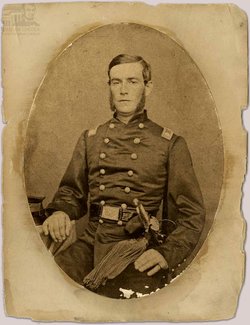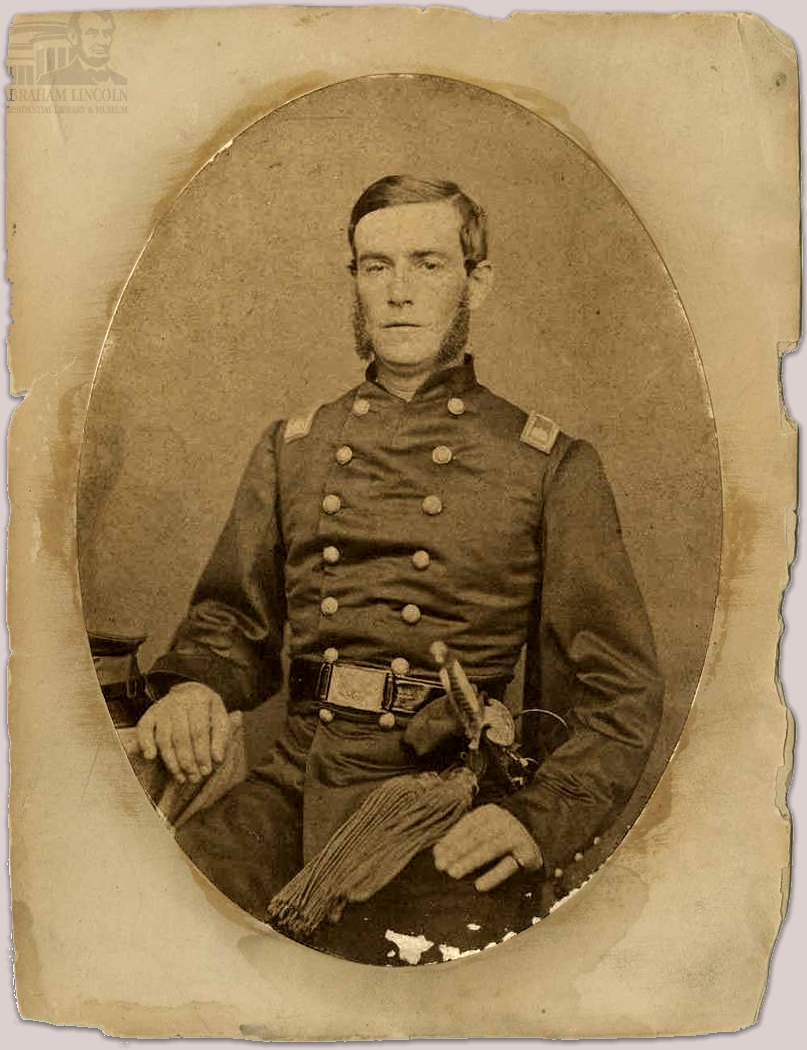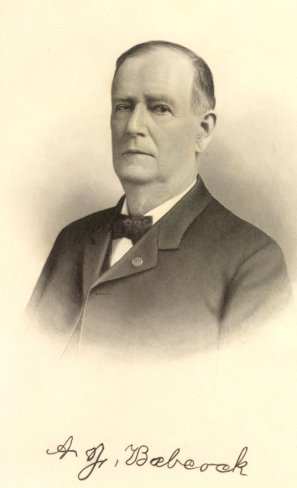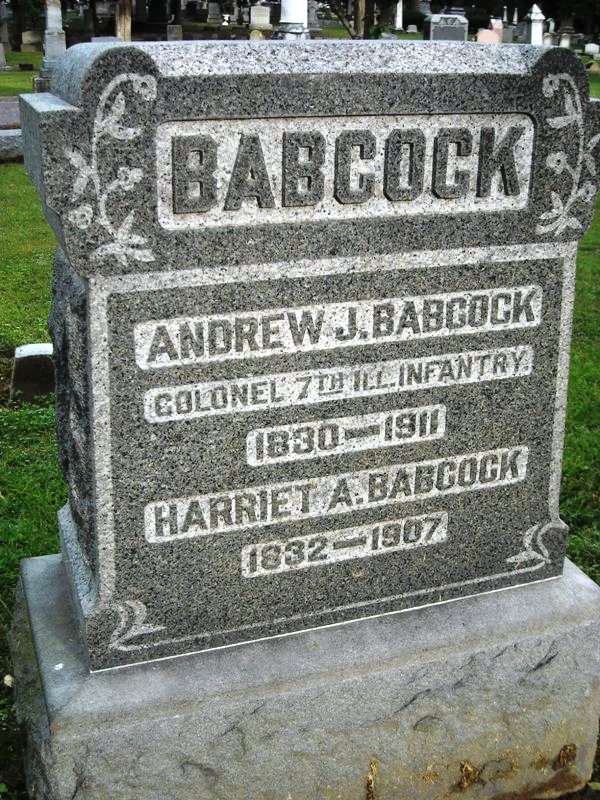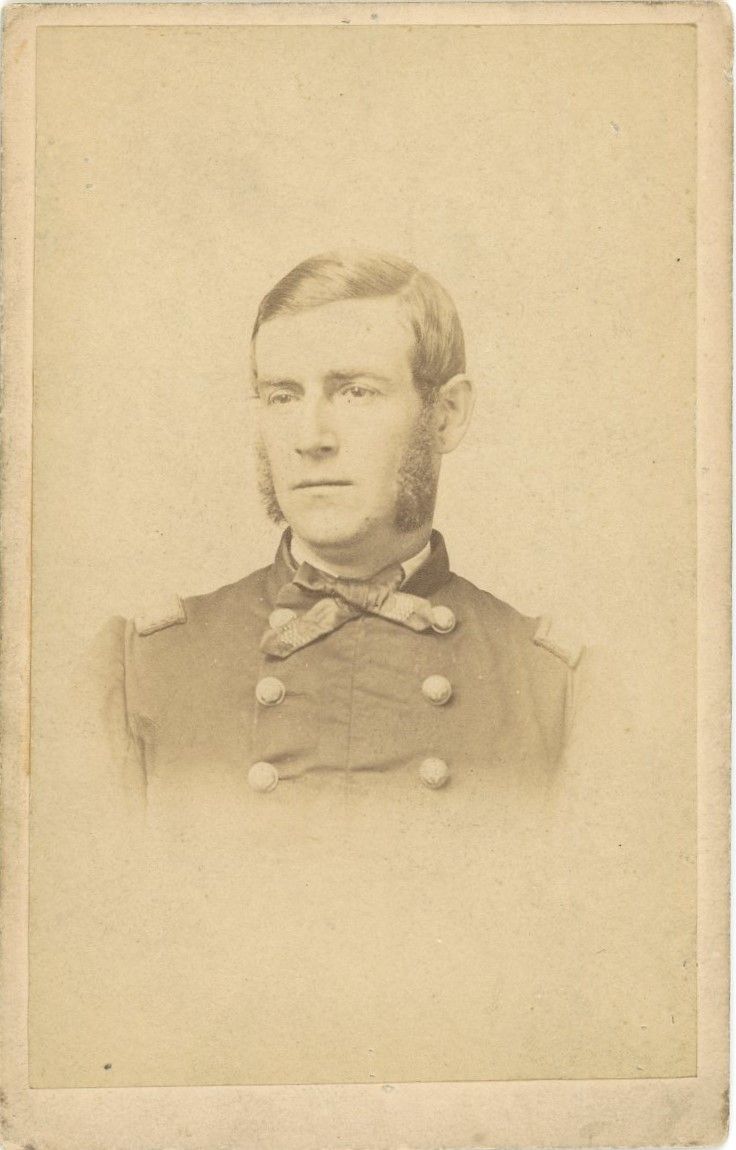1850 US Census--Andrew as a coppersmith at Lowell, Mass.;
As of 18 April 1910 Andrew was father-in-law in household of Zacharia D. Graham at St. Paul. Susan Graham (c.1853 born in New Hampshire) was Andrew's daughter. Information provided by John Heseltine.
~~~~~~~~~~~~~~~~~~
Died, at the residence of his daughter, Mrs. Sue L. Graham, 168 Auburn avenue, St. Paul, Minn., Thursday, Jan. 12, 1911, at 4 o'clock a.m., of the infirmities of age, Colonel Andrew Jackson Babcock, aged 80 years and six months. The funeral will take place from the residence of his son, James C. Babcock, 439 West Edwards street, this city, and will be in charge of Stephenson post G. A. R., this being his request, and the burial will be in Oak Ridge cemetery.
All who knew Colonel Babcock in this city, and the circle is large, who admire true manhood, unswerving integrity and all those qualities which go to make up the sum of good citizenship will feel deep sorrow that the time had come when Andrew J. Babcock must succumb to the inevitable and pass from the scenes of this life. As citizen, soldier, friend, neighbor, father and husband, he filled the full measure of the requirements placed upon him. AS a soldier he was brave and unflinching in his duties, as a business man and a public servant he was honest and conscientious; in his relation with his family and his neighbors, he was a model of that conduct which characterizes the true gentleman.
He was loyal to his friends and magnanimous to his enemies. When he was called to the defense of his country against internecine foes, he responded without hesitation and knew no relaxation of energy until the issue was settled. When the war was over and he had laid down his sword, he was one of the first to bury the past and work for the rehabilitation of the union and the restoration of friendly relations between the rent factions. No one ever heard him say a disparaging word of the bravery of the men who fought against him in that awful struggle. While not surrendering one jot or title of his conviction as to the right or wrong of the questions which caused the great civil war, he was willing to bury them and take into consideration the fact that, however erroneous might have been the principles for which his opponents fought, they had proved their devotion by their sacrifice and he never hesitated to pay tribute to the valor of the southern soldiery. "Why, we were fighting against our own flesh and blood," he used to say, "And the only difference between the northern and southern troops was, that while they had the greater dash and bravery in the outset, we had more perseverance and sticking qualities."
During a visit to the south where he spent two winters in the latter part of his life he made firm friends of a number of ex-confederate officers with whom he formed an acquaintance at the winter resort where he was staying. Like all old soldiers, he delighted to "fight his battles over," but in his relations of these stirring events, in which he bore an honorable part, there was no exaltation of self. He had a shrewd sense of humor hid under a blunt directness of speech which made it all the more forcible to those who knew and understood him. He could appreciate the humor of a situation even when he was the object of the joke. This was proven in one instance when a young newspaper man, a dear friend and neighbor, wrote a humorous description in which he was posed as the chief figure in a ludicrous situation and waited in fear and trembling to see how he would take it. When Col. Babcock met the writer next he congratulated him on the truthfulness of the word picture and told him he had preserved the article by pasting it in his scrapbook. "It was true to the dot," he said, "and so funny that I had to like it."
After all, the true characteristic of Andrew J. Babcock was his innate honesty and truthfulness. He could not abide a lie or the appearance of one. Col. Charles P. Hitch, under whom he served as deputy United States marshal used to tell a good story of a time when Col. Babcock was requested to write a letter in which certain statements were to be made, harmless in themselves, but to which Col. Babcock took exceptions as not being literally true. He wrote the letter but it was an expurgated edition.
Col. Babcock's experience extended over a large and important era of the history of the United States. As a boy, he was present at the dedication of Bunker Hill monument in 1843 and heard the great Daniel Webster deliver his famous oration. In relating this incident, he mentioned the fact that the iron doors of this famous structure were made by his father, and that he had to walk from Dorchester to Boston to witness the ceremonies. He came to Illinois at the time when great issues were at stake. When the time came he aligned himself on the side that he believed was right and knew "no shadow of turning" until those issues were settled. The sternest man of war is ever the gentlest man of peace and so it may be said of him as it was said of Brutus, "his life was gentle" and in him were the elements so mixed that nature might stand up to all the world and say "this was a man."
Andrew Jackson Babcock, a son of Robert Gilmore and Lucy Blackman Babcock, was born in Dorchester, Mass., on July 12, 1830. When nineteen years of age he joined the Lowell Mechanic Phalanx, Fifth Regiment, Massachusetts Militia. He was three years a member, and was a well drilled soldier. Later Gen. Benjamin E. Butler was major and after lieutenant-colonel of the same regiment. In 1856 Col. Babcock moved to Springfield, Ill. Two years later he joined as a private the military company, then organized, called the Springfield Grays. He rose in rank from step to step until in 1861, he was first lieutenant of the company.
At the breaking out of the war he enlisted, April 16, 1861, under the first call for three months men, and was mustered into service April 25, 1861, as captain of Company I, Seventh Illinois Infantry, by Captain John Pope, who was later General Pope. The Seventh was the first Illinois Regiment mustered into service but was called the Seventh to keep intact the six regiments that Illinois furnished in the Mexican war.
At the expiration of the term of enlistment he with his company was mustered out of service near Cairo, Ill., and the same day, July 25, 1861, he was mustered into service for three years as lieutenant colonel of the Seventh Illinois infantry. Although he ranked as lieutenant colonel, he commanded his regiment almost from the start, and was in command during the three days' battle at Ft. Donelson, Feb. 13-15, 1862, and on the 25th of March, 1862, for gallant and meritorious service rendered at Ft. Donelson, was commissioned colonel of the regiment.
At the battle of Corinth, Oct. 3 and 4, 1862, the regiment was engaged both days under the command of Colonel Babcock. On account of serious illness of members of his family at home, on Feb. 18, 1863, he resigned the service. Colonel Babcock was held in the highest esteem by officers and men of his command. He was a brave officer and careful of the men under him. He was a devoted member of the Seventh Illinois Infantry Survivors association.
At the breaking out of the war Colonel Babcock was in the plumbing business, his store being located on North Fifth street. For several years he served as revenue gauger, being located at Pekin, Ill., he also served as deputy marshal under Mr. Charls P. Hitch, United States marshal, for a period of twelve years.
On Feb. 3, 1843, Colonel Babcock was married to Harriet Ann Palmer, at Concord, N. H. He is survived by four children, a daughter, Mrs. Sue L. Graham, of St. Paul, Minn.; and three sons, George S., of Colorado Springs, Colo., Charles A. and James C. of this city; a sister, Mrs. Louise Bolton, living at Milwaukee, Wis., and a brother Robert, living at Newport, R. I., and several grand children. Colonel Babcock's wife died Nov. 26, 1907. He was a member of Central lodge No. 71, Masons.
IL State Register, Springfield, IL 10-13-1911
1850 US Census--Andrew as a coppersmith at Lowell, Mass.;
As of 18 April 1910 Andrew was father-in-law in household of Zacharia D. Graham at St. Paul. Susan Graham (c.1853 born in New Hampshire) was Andrew's daughter. Information provided by John Heseltine.
~~~~~~~~~~~~~~~~~~
Died, at the residence of his daughter, Mrs. Sue L. Graham, 168 Auburn avenue, St. Paul, Minn., Thursday, Jan. 12, 1911, at 4 o'clock a.m., of the infirmities of age, Colonel Andrew Jackson Babcock, aged 80 years and six months. The funeral will take place from the residence of his son, James C. Babcock, 439 West Edwards street, this city, and will be in charge of Stephenson post G. A. R., this being his request, and the burial will be in Oak Ridge cemetery.
All who knew Colonel Babcock in this city, and the circle is large, who admire true manhood, unswerving integrity and all those qualities which go to make up the sum of good citizenship will feel deep sorrow that the time had come when Andrew J. Babcock must succumb to the inevitable and pass from the scenes of this life. As citizen, soldier, friend, neighbor, father and husband, he filled the full measure of the requirements placed upon him. AS a soldier he was brave and unflinching in his duties, as a business man and a public servant he was honest and conscientious; in his relation with his family and his neighbors, he was a model of that conduct which characterizes the true gentleman.
He was loyal to his friends and magnanimous to his enemies. When he was called to the defense of his country against internecine foes, he responded without hesitation and knew no relaxation of energy until the issue was settled. When the war was over and he had laid down his sword, he was one of the first to bury the past and work for the rehabilitation of the union and the restoration of friendly relations between the rent factions. No one ever heard him say a disparaging word of the bravery of the men who fought against him in that awful struggle. While not surrendering one jot or title of his conviction as to the right or wrong of the questions which caused the great civil war, he was willing to bury them and take into consideration the fact that, however erroneous might have been the principles for which his opponents fought, they had proved their devotion by their sacrifice and he never hesitated to pay tribute to the valor of the southern soldiery. "Why, we were fighting against our own flesh and blood," he used to say, "And the only difference between the northern and southern troops was, that while they had the greater dash and bravery in the outset, we had more perseverance and sticking qualities."
During a visit to the south where he spent two winters in the latter part of his life he made firm friends of a number of ex-confederate officers with whom he formed an acquaintance at the winter resort where he was staying. Like all old soldiers, he delighted to "fight his battles over," but in his relations of these stirring events, in which he bore an honorable part, there was no exaltation of self. He had a shrewd sense of humor hid under a blunt directness of speech which made it all the more forcible to those who knew and understood him. He could appreciate the humor of a situation even when he was the object of the joke. This was proven in one instance when a young newspaper man, a dear friend and neighbor, wrote a humorous description in which he was posed as the chief figure in a ludicrous situation and waited in fear and trembling to see how he would take it. When Col. Babcock met the writer next he congratulated him on the truthfulness of the word picture and told him he had preserved the article by pasting it in his scrapbook. "It was true to the dot," he said, "and so funny that I had to like it."
After all, the true characteristic of Andrew J. Babcock was his innate honesty and truthfulness. He could not abide a lie or the appearance of one. Col. Charles P. Hitch, under whom he served as deputy United States marshal used to tell a good story of a time when Col. Babcock was requested to write a letter in which certain statements were to be made, harmless in themselves, but to which Col. Babcock took exceptions as not being literally true. He wrote the letter but it was an expurgated edition.
Col. Babcock's experience extended over a large and important era of the history of the United States. As a boy, he was present at the dedication of Bunker Hill monument in 1843 and heard the great Daniel Webster deliver his famous oration. In relating this incident, he mentioned the fact that the iron doors of this famous structure were made by his father, and that he had to walk from Dorchester to Boston to witness the ceremonies. He came to Illinois at the time when great issues were at stake. When the time came he aligned himself on the side that he believed was right and knew "no shadow of turning" until those issues were settled. The sternest man of war is ever the gentlest man of peace and so it may be said of him as it was said of Brutus, "his life was gentle" and in him were the elements so mixed that nature might stand up to all the world and say "this was a man."
Andrew Jackson Babcock, a son of Robert Gilmore and Lucy Blackman Babcock, was born in Dorchester, Mass., on July 12, 1830. When nineteen years of age he joined the Lowell Mechanic Phalanx, Fifth Regiment, Massachusetts Militia. He was three years a member, and was a well drilled soldier. Later Gen. Benjamin E. Butler was major and after lieutenant-colonel of the same regiment. In 1856 Col. Babcock moved to Springfield, Ill. Two years later he joined as a private the military company, then organized, called the Springfield Grays. He rose in rank from step to step until in 1861, he was first lieutenant of the company.
At the breaking out of the war he enlisted, April 16, 1861, under the first call for three months men, and was mustered into service April 25, 1861, as captain of Company I, Seventh Illinois Infantry, by Captain John Pope, who was later General Pope. The Seventh was the first Illinois Regiment mustered into service but was called the Seventh to keep intact the six regiments that Illinois furnished in the Mexican war.
At the expiration of the term of enlistment he with his company was mustered out of service near Cairo, Ill., and the same day, July 25, 1861, he was mustered into service for three years as lieutenant colonel of the Seventh Illinois infantry. Although he ranked as lieutenant colonel, he commanded his regiment almost from the start, and was in command during the three days' battle at Ft. Donelson, Feb. 13-15, 1862, and on the 25th of March, 1862, for gallant and meritorious service rendered at Ft. Donelson, was commissioned colonel of the regiment.
At the battle of Corinth, Oct. 3 and 4, 1862, the regiment was engaged both days under the command of Colonel Babcock. On account of serious illness of members of his family at home, on Feb. 18, 1863, he resigned the service. Colonel Babcock was held in the highest esteem by officers and men of his command. He was a brave officer and careful of the men under him. He was a devoted member of the Seventh Illinois Infantry Survivors association.
At the breaking out of the war Colonel Babcock was in the plumbing business, his store being located on North Fifth street. For several years he served as revenue gauger, being located at Pekin, Ill., he also served as deputy marshal under Mr. Charls P. Hitch, United States marshal, for a period of twelve years.
On Feb. 3, 1843, Colonel Babcock was married to Harriet Ann Palmer, at Concord, N. H. He is survived by four children, a daughter, Mrs. Sue L. Graham, of St. Paul, Minn.; and three sons, George S., of Colorado Springs, Colo., Charles A. and James C. of this city; a sister, Mrs. Louise Bolton, living at Milwaukee, Wis., and a brother Robert, living at Newport, R. I., and several grand children. Colonel Babcock's wife died Nov. 26, 1907. He was a member of Central lodge No. 71, Masons.
IL State Register, Springfield, IL 10-13-1911
Family Members
Sponsored by Ancestry
Advertisement
Advertisement
